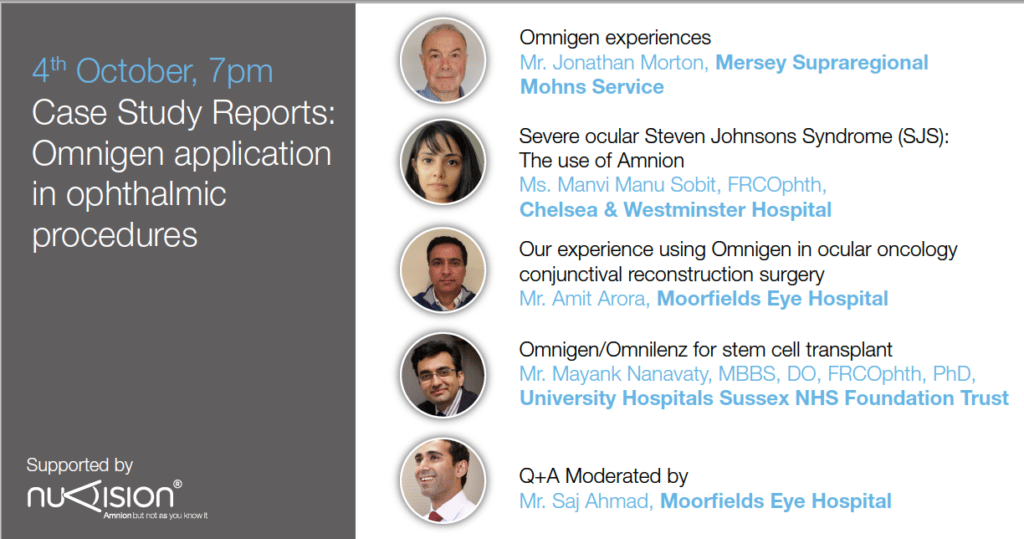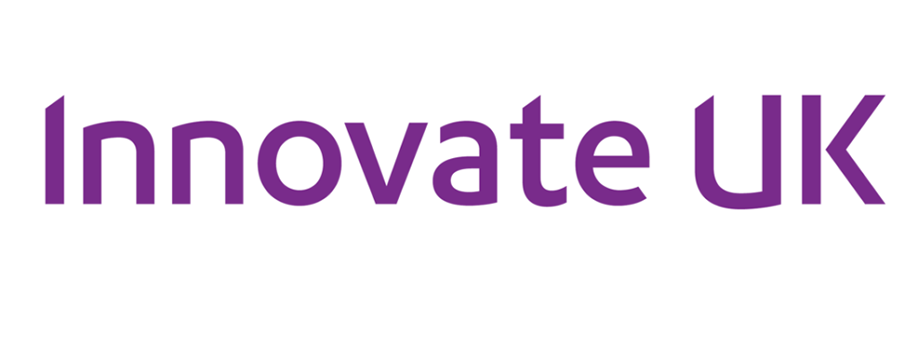Webinar round-up: Five clinicians from four NHS centres present on their case report applications of amniotic membrane in different ophthalmic conditions in a webinar sponsored by NuVision Biotherapies Ltd.
The webinar launched on Tuesday 4th October, 7pm BST with the introduction of Mr. Sajjad Ahmad, a consultant ophthalmic surgeon from Moorfields Eye Hospital NHS Trust, who chaired the meeting and announced the cocktail of different amniotic membrane transplantations across different ophthalmic specialities to be discussed during the session.
First to take the virtual floor was Mr. Jonathan Morton, a consultant plastic surgeon from Merseyside Supraregional Mohns Service, serving St Helens and Merseyside districts. Mr. Morton presented his results from 5 patients, with a range of inferior and exterior fornix and lid injuries. Omnigen was used as an adjunct for treatment allowed for the full ocular movement following ocular basal cell carcinoma removal. Mr. Morton stated how the Omnigen did a “great job” at rebuilding the interior and exterior fornix by replacing any missing conjunctiva. Mr. Morton stated his surprise at how much Omnigen was like that of the native conjunctiva once incorporated.
The second talk was given by Ms. Manvi Manu Sobti from Chelsea and Westminster Hospital, presenting her experience applying Omnigen in patients with acute Stephens Johnson Syndrome in a multi-disciplinary team, including burns and intensive care specialists at the trust. Ms. Manu Sobti uses amniotic membrane as it acts as a biological mechanical barrier between the ocular surface and mucosal surfaces; dresses and protects the eye and limits the development of inflammation. Ms. Sobti presented 3 cases of using amniotic membrane within Toxic Epidermal Necrolysis and SJS patients. The keynote of Ms. Sobti’s talk was the requirement to place amniotic membrane urgently if the bulbar conjunctiva has de-epithelised and prior to any corneal involvement.
The third of our speakers was Mr. Amit Arora from Moorfields Eye Hospital, a consultant ophthalmic surgeon who specialises in patients with ocular surface tumours. Mr Arora presented the results of 40 grafts from two different time point audits to show the teams improvement in complication rate and rates of relapse after Bette understanding of the process for Omnigen application. Additionally, through the inclusion of adjunctive therapies, such as, chemotherapy or radiotherapy.
And finally, Mr. Mayank Nanavaty from the University Hospitals Sussex NHS Foundation Trust, who presented on the use of Omnigen in a modified allogenic Simple Limbal Epithelial Transplantation technique. Using larger limbal explants rather than the smaller explants traditional used in Simple Limbal Epithelial Transplantation glued to a clear and denuded ocular surface. Following this an amniotic membrane patch is glued to the surface, followed by the application of an OmniLenz, bandage contact lens to keep the Omnigen patch in place.
Following their presentations, all speakers were involved in a question-and-answer session led by Mr. Ahmad on various aspects of their case reports. The webinar was sponsored by NuVision Biotherapies Ltd (www.nu-vision.co.uk) who manufacture Omnigen, a human-derived amniotic membrane tissue that is preserved using the Tereo® manufacture process. This allows the amniotic membrane to be preserved as a dry membrane that can be stored between 2 – 25oC and can be rehydrated in vivo. Amniotic membrane is transplanted in ophthalmic subgroups due to its barrier properties that support the natural healing of the ocular surface.
NuVision would like to send their warmest thanks to all speakers and attendees for joining and providing an interesting and fruitful environment to discuss the recent case reports of Omnigen application. To catch-up on all aspects from the webinar, please contact Tonicha Spencer, spencer@nu-vision.co.uk who will gladly provide access to the video recording of session.

Moorfields Eye Hospital
Moorfields Eye Hospital NHS Foundation Trust is the leading provider of eye health services in the UK and a world-class centre of excellence for ophthalmic research and education. With treatment of patients around 30 sites in and around London, Moorfields focus is the treatment and care of NHS patients with a wide range of eye problems, from common complaints to rare conditions that require treatment not available elsewhere in the UK. The volume and variety of conditions treated by our clinicians means that they have a unique range of skills and knowledge.
Continue reading:
Mersey Supraregional Mohns Service
The Mersey Regional Burns, Plastic and Reconstructive Surgery Unit provides world class care to patients from Merseyside, Cheshire, North Wales, Isle of Man and from other areas across the UK. The Burns and Plastic Directorate team are proud to set the highest standards when it comes to quality indicators and all members of the multi-disciplinary team who always work closely together to ensure all our patients receive safe and high-quality treatment whilst under our care.
Continue reading:
https://www.sthk.nhs.uk/our-services?service=88
Chelsea and Westminster Hospital
The Adult Ophthalmology (Eye) Department at Chelsea and Westminster Hospital provides eye care for a wide range of general and specialist ophthalmic conditions. We assess and treat patients with many general ophthalmic conditions that include cataracts, glaucoma, retina, oculoplastics, uveitis, ocular infection, and ocular inflammatory disease.
Continue reading:
https://www.chelwest.nhs.uk
University Hospitals Sussex NHS Foundation Trust
Sussex Eye Hospital diagnose and treats a range of eye conditions, with over 13 services offered. Including, cataract, glaucoma, paediatric, vitreo-retinal, and corneal services. On top of this, the service also has. 24-hour ophthalmic A&E department and provides an advice service through an eye clinic liaison officer.
Continue reading:
https://www.bsuh.nhs.uk/services/ophthalmology/
NuVision Biotherapies
Based in MediCity, Nottingham, NuVision Biotherapies is a regenerative medicine company recently spun out from Academic Ophthalmology, School of Medicine, University of Nottingham. NuVision was established in 2015, founded on investment from Mercia Fund Management, to develop and bring to market cutting edge, regenerative therapies.
About Omnigen
Omnigen is a patented, dry preparation of human amniotic membrane, made from the sac surrounding the baby during pregnancy. The Tereo® manufacturing process, developed at the University of Nottingham Ophthalmology department, transforms this waste product of birth into a sterile and stable dry regenerative therapy that can be easily shipped and accessed anywhere in the world. Omnigen is applied directly to the wound dry and is rapidly and effectively rehydrated using surrounding moisture to immediately reactivate the beneficial properties to promote tissue repair and healing in a variety of ways. The product represents a unique and versatile “off-the-shelf” regenerative product and may be stored long term. The Tereo process preserves the wound healing action and provides surgeons with an effective sight saving therapy that could provide a meaningful benefit to patients, including those suffering from ocular surface disease and conditions with unmet medical need.
About OmniLenz
OmniLenz is a bespoke bandage contact lens designed to apply and hold Omnigen at the ocular surface without the need for sutures or surgery. OmniLenz is manufactured for exclusively for NuVision by Menicon UK. Omnigen can be applied by OmniLenz using a simple 4 – 6-minute procedure in an outpatient setting. The decision to apply Omnigen to the ocular surface using OmniLenz is at the discretion of the clinician.
Continue reading:
www.nu-vision.co.uk





